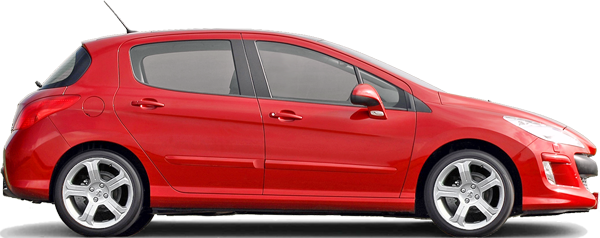The Comparative Analysis :
Hyundai i30 1.0 T-GDI (17 - 18) vs. Peugeot 308 5-door HDi FAP 135 Automatic (07 - 09)
€ 19,900

€ 25,000

€ 19,900
Base Price ⓘBase price of a new vehicle with standard equipment in Germany at market launch.
€ 25,000
ⓘBase price of a new vehicle with standard equipment in Germany at market launch. Price Info
Vehicle Dimensions
The dimensions of these vehicles differ slightly. The Hyundai i30 1.0 T-GDI is 2.5 inches longer, 0.8 inches narrower and 1.7 inches lower than the Peugeot 308 HDi FAP 135.
Hyundai i30 1.0 T-GDI
Peugeot 308 HDi FAP 135
57.3
70.7
80.7
59
71.5
80.2
70.7 in
Width
71.5 in
80.7 in
Width Incl. Mirrors
80.2 in
57.3 in
Height
59 in
104.3
170.9
102.7
168.3
170.9 in
Length
168.3 in
104.3 in
Wheelbase
102.7 in
Vehicle Weight
Hyundai i30 1.0 T-GDI
Peugeot 308 HDi FAP 135
2798 lb
Curb Weight
3355 lb
3968 lb
Gross Vehicle
Weight
Weight
4292 lb

Weight Difference:
558 lb
16.63 %

General
Hyundai i30 1.0 T-GDI
Peugeot 308 HDi FAP 135
PDE
Generation
4*
Hatchback
Car Body Style
Hatchback
Mid-Grade Unleaded
Fuel Type
Diesel

Front-wheel drive
Drivetrain
Front-wheel drive

6-speed manual transmission
Transmission
6-speed automatic transmission
Engine
Hyundai i30 1.0 T-GDI
Peugeot 308 HDi FAP 135
Straight-three gasoline engine with turbocharger
Engine Type
Straight-four diesel engine with turbocharger
Engine Code
RHR, RH01
4
Valves
4
3
Cylinders
4
1 L / 49 cu in
Displacement
2 L / 98 cu in
118 hp
at 6000 rpm
Power
134 hp
at 4000 rpm
Hyundai i30 1.0 T-GDI
118 hp
134 hp
Peugeot 308 HDi FAP 135
126 lb‑ft
at 1500 rpm
Max. Torque
236 lb‑ft
at 2000 rpm
Hyundai i30 1.0 T-GDI
126 lb‑ft
236 lb‑ft
Peugeot 308 HDi FAP 135
Performance
Hyundai i30 1.0 T-GDI
Peugeot 308 HDi FAP 135
118 mph
Maximum Speed
124 mph
11.1 sec
Acceleration 0 to 62 mph
10.6 sec
62 mph
62
mph
mph
505 ft
0.000 sec

Hyundai i30 1.0 T-GDI
62 mph
62
mph
mph
482 ft
0.000 sec

Peugeot 308 HDi FAP 135
▶ REPLAY
23.71 lb/hp
Weight-to-Power Ratio
25.04 lb/hp
Hyundai i30 1.0 T-GDI
23.71 lb/hp
25.04 lb/hp
Peugeot 308 HDi FAP 135
Fuel Economy / Emissions
Hyundai i30 1.0 T-GDI
Peugeot 308 HDi FAP 135
Fuel Economy
48 mpg
combined
35 mpg
Hyundai i30 1.0 T-GDI
48 mpg
35 mpg
Peugeot 308 HDi FAP 135
42 mpg
city
25 mpg
53 mpg
highway
44 mpg
13.2 gal
Fuel Tank Capacity
15.9 gal
634 mi
Range
548 mi
Hyundai i30 1.0 T-GDI
634 mi
548 mi
Peugeot 308 HDi FAP 135
Environmental Impact
92.9 kWh
Total Energy Consumption
per 100 miles ⓘThe total energy consumption per 100 miles is the amount of energy consumed by a vehicle when burning fuel or using electricity per 100 miles (final energy), and the energy required to produce the appropriate amount of fuel or electricity (primary energy).
per 100 miles ⓘThe total energy consumption per 100 miles is the amount of energy consumed by a vehicle when burning fuel or using electricity per 100 miles (final energy), and the energy required to produce the appropriate amount of fuel or electricity (primary energy).
139.9 kWh
Hyundai i30 1.0 T-GDI
92.9 kWh
139.9 kWh
Peugeot 308 HDi FAP 135
Euro 6b (NEFZ)
Emission Standard
Euro 4
180 g/mi (NEFZ)
CO2 Emissions
290 g/mi (NEFZ)
Practical Convenience
Hyundai i30 1.0 T-GDI
Peugeot 308 HDi FAP 135
5
Doors
5
5
No. of Seats
5
1171 lb
Maximum Payload
937 lb
11.2 cu ft
Trunk Volume
9.9 cu ft









36.8 cu ft
Cargo Volume (Seats Down)
34 cu ft

















